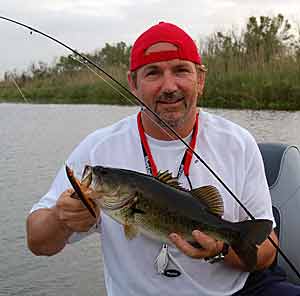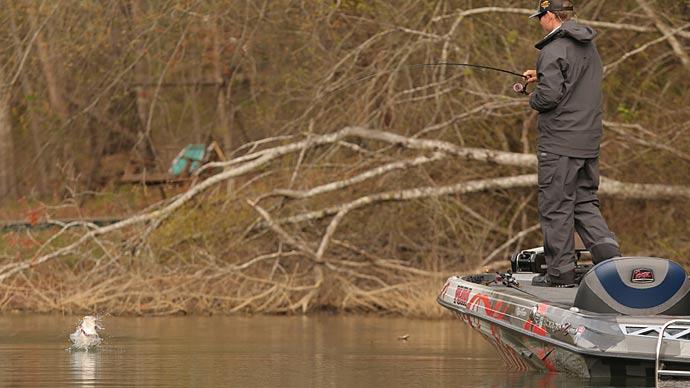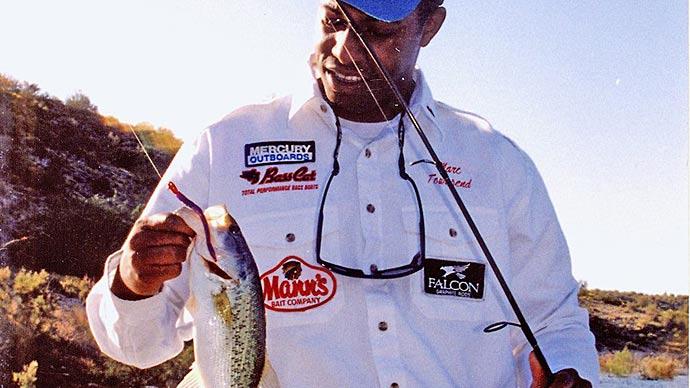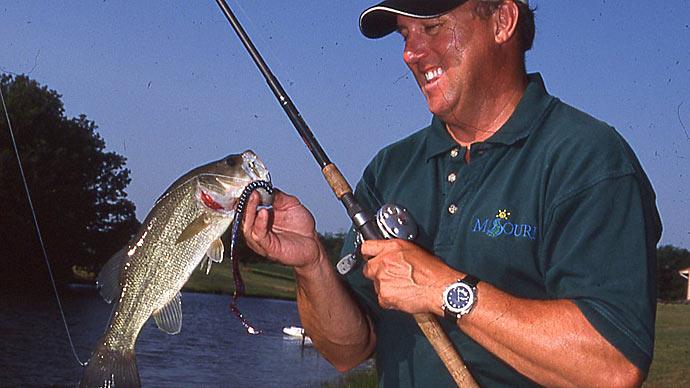
Several years ago, while doing fall fishing at Lake of the Ozarks with my longtime friend Jeff, I learned a valuable lesson I have always remembered. We were working a steep bank near some tree falls, trying desperately to finesse a lunker largemouth into the boat. Jeff was slowly walking a Texas-rigged 7-inch black worm with a 3/8 oz. bullet weight across the bottom while raising and lowering my favorite pumpkin-colored twin-tail grub on a 3/8 oz. jig head through the clear 72-degree water. It was early in the day, and fishing was good.
Jeff had just cast along the left side of a 10-foot deep crappie bed and was slowly working the worm toward the boat when suddenly I felt the boat shudder and heard a low groan as Jeff set the hook. "Darn," he yelled with frustration, and I knew immediately that he lost the fish. Then, as I look over, I notice the oddest thing. Looking on from the back of the boat, I realize Jeff's not retrieving the worm. He hasn't given up. Instead, I see him do something extraordinary I did not expect. I figured he would quickly reel in the worm, recast, and try again. No, Jeff did move the boat or reel in the worm. As the bait sank, Jeff gently took up the slack line, twitched the bait ever so slightly, lowered the tip of the rod, and waited. Sure enough, wham, a second hit, and a keeper bass. Jeff allowed the bass to reacquire the bait by waiting and landed a nice lunker in the boat. This is what we call catching a fish on the "double tap."
The term "double tap" was initially coined in low-budget zombie movies where scantily clad teen girls and moronic teen boys fought for their lives against the undead. The idea is that to make sure a zombie is taken out, you must stab, slash, or shoot the creature not once but twice, hence the term "double tap." Some things need to be whacked twice to be put away truly. Bass, like zombies, are often landed by taking advantage of the all-important "double tap."
Too often, anglers don't allow fish to be hooked. We pull the bait away from the bass before it has a chance to get hooked. What I have come to realize over time is that there is a contingent of fish that want our lure, and it is our responsibility as anglers to give these fish every opportunity to be caught.
When we feel the hit but miss the initial hook set, we should not give up on that cast. Bass will often slap bait or corral a bait ball. Not every hit is a bite. The minor slap or hit tells us there is a seriously interested fish nearby and that it is willing and ready to bite. You can land more fish by letting the bait sit after you feel that initial hit.
There are four reasons to let your bait sit after a missed hook set. First, bass are aggressive hunters and will not give up trying to suck in bait fish despite missing on the first attack. I have seen wounded baitfish hit repeatedly on the surface until finally devoured. Bass are tenacious. On many of my excursions, SCUBA diving around sunken brush piles, I have seen many bass repeatedly attack baitfish.
The second reason for letting your bait settle and wait for the second hit is because of secondary hunters. Particularly with aggressive smallmouth bass, a second or third bass will often come up to steal the prey or pick up the crumbs once a first bass strikes. It is common to watch a bass reeled in and see a second or third fish follow the hooked fish to the boat.
The third reason to keep your bait in the water and not retrieve it after you feel a hit is because sometimes the first hit you feel is not necessarily a bite. Often, bass will slap a bait to see how it reacts in preparation for the bite. Bass will smack baitfish to move them out of the cover, or the bass may miss the hit. Retrieving a bait too quickly before the bass can reacquire its prey often will deny the bass any chance at the lure and result in a truly missed fish.
During springtime, there is a fourth reason to allow your bait to sit after a missed bite. During the spring, spawning bass actively clean their bedding area by repeatedly picking up and spitting out foreign debris. In this case, the bass will pick up and spit the bait twice and thrice, giving you a second and even a third shot at setting the hook. It should be remembered, however, that when catching and releasing spawning bass, you return the bass to the water as quickly as possible so the eggs have the greatest chance of survival.
Wait for the double tap. If you miss the first hit, know in your heart that there is an interested fish, a fish that is nearby, and more than likely, there is another fish close, ready to bite. Don't give up and retrieve your bait because you felt that first strike but didn't get the hook set. Give the bass a second try with the "double tap."




